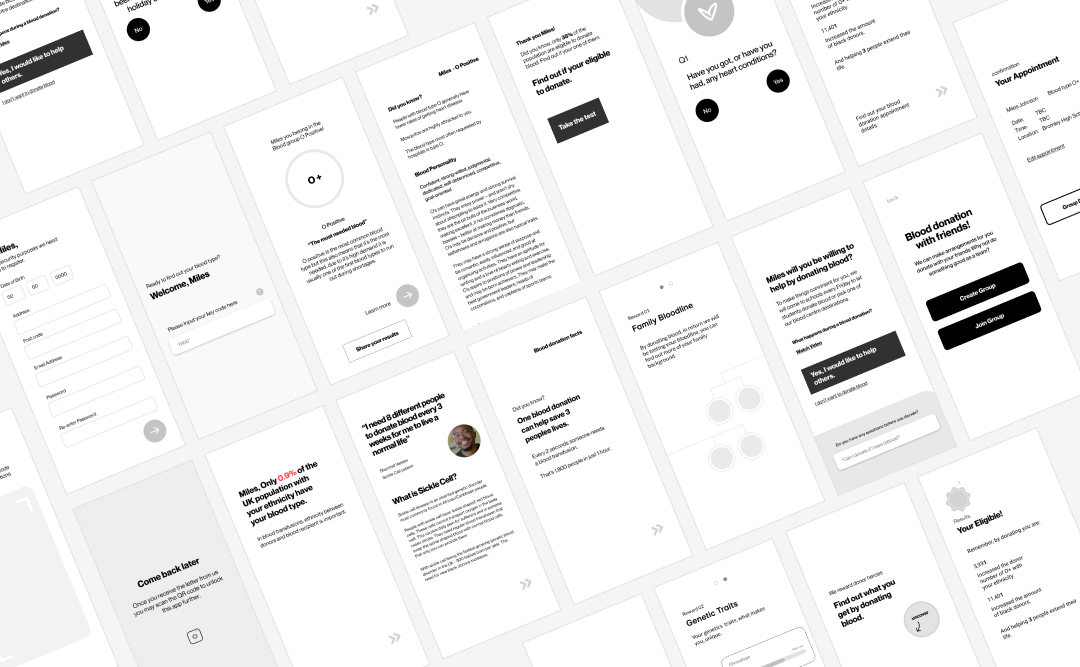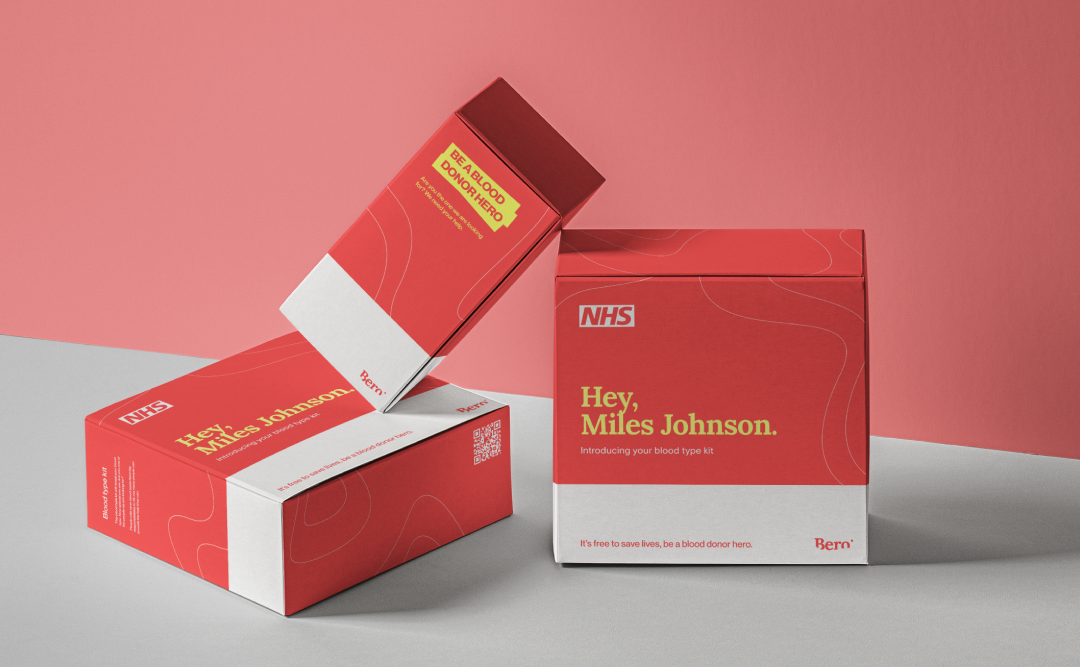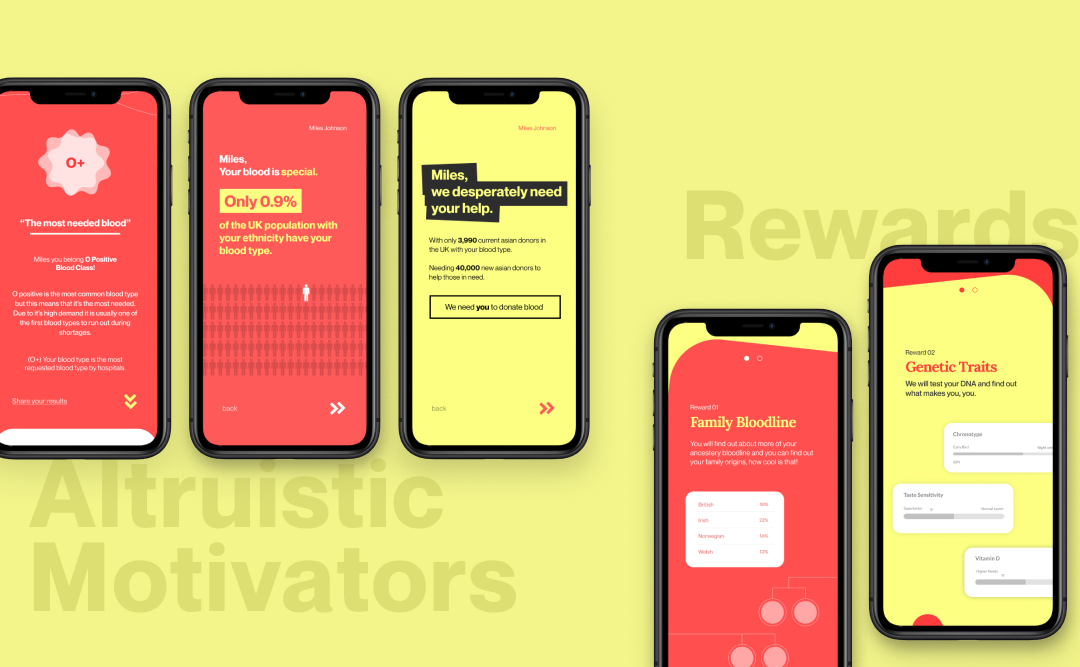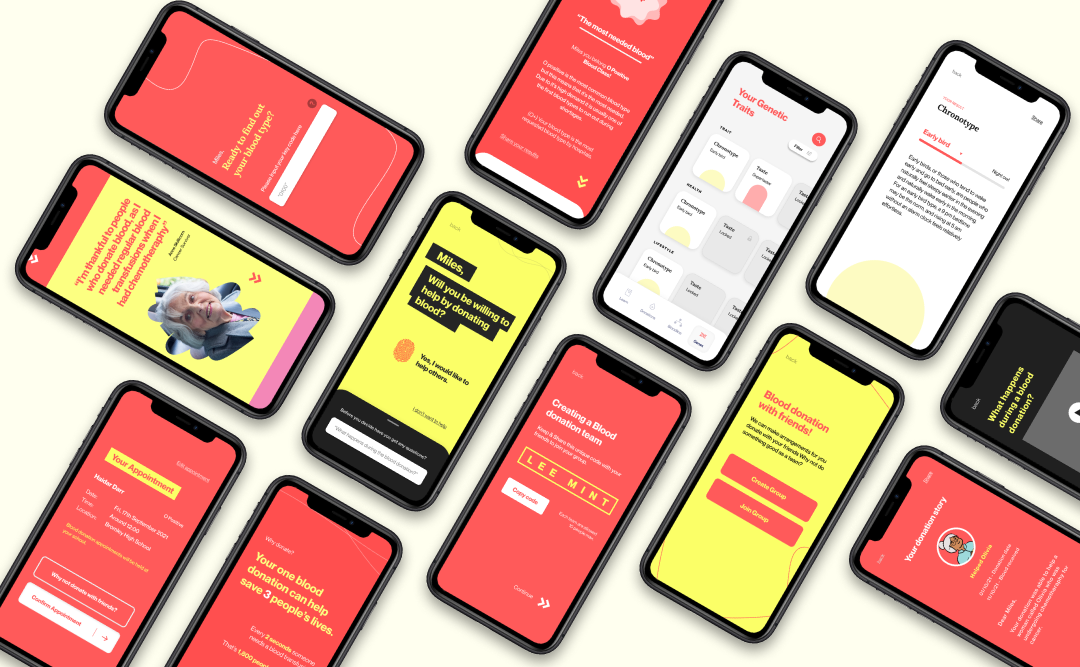Major project
Increasing blood donations to support sickle cell patients [Read more]

Bero is a service in partnership with the NHS aimed at creating a sustainable blood donorship by highly engaging teenagers aged 16-17 to donate for the first time.
The service provides a fun and highly engaging way for teenagers to learn about blood donations through the free Bero blood type kits delivered to their address. The experience is deeply tied to the app that is designed to altruistically and hedonically motivate users to donate. The app experience automatically allocates appointments to a familiar location to users, making the process highly accessible and convenient.

The Problem
People born with the genetic disorder Sickle Cell need regular blood transfusions to live a normal life, if left untreated can cause side effects such as severe pain, stroke, and even a heart attack.
With the ageing population of blood donors in the UK, Around 135,000 new donors a year are needed to replace those who can no longer donate (NHS Blood and Transplant, 2020), and over half of the current donors being aged over 45. To build a sustainable and resilient donor base, it is paramount to engage younger generations to donate blood.

User Research
The project aimed to investigate the barriers and motivations of young black British people with registering and donating blood.
A survey was conducted to find quantitative and qualitative data on the barriers and motivations of blood donors and non-blood donors from different ethnicities, to identify if there are any obvious barriers to blood donations unique to the target user group.
Ethnographies were conducted with non-donors through think-aloud of their first attempt to register and sign up for a blood donation appointment online. This highlighted key barriers to the experience of booking an appointment on the website.
User Interviews were conducted with 3 user groups to gain qualitative and in-depth data to be compared and identify key differences to each user group, highlighting barriers, opportunities, and motivators to blood donations.
Co-creation of an experience map of a typical blood donation appointment was conducted with current donors to highlight barriers and opportunities to the service. This was to gain deep empathy and understanding of the donation appointments.

Insights & Opportunities
The Key insights discovered in the research stage are:
Awareness & Lack of Motivation - The key barrier that was discovered was that general awareness is a big issue, with most non-donors expressing little to no blood donation awareness. However, awareness alone doesn't spark action; motivators and an opportunity to make action are crucially needed at the awareness stage or else it becomes an afterthought.
Inaccessibility to blood donations - The booking website to blood donations proved to be an incredibly negative experience causing all participants to lose any motivation to carry on. Inaccessibility to blood donation appointments also implied to users that their efforts were not needed as there must be a lot of people already donating.
Sense of Responsibility - This insight showed to be a key motivator for current donors, The Acknowledgement of their power: that donating blood does impact and saves lives. This motivated current donors to take action and hearing that their blood was rare or in need made them feel a sense of responsibility.

Design Development
Using the key insights identified in the research stage, a solution was generated through multiple design ideation and iterations:
4 Co-creation workshops were conducted with end-users and UX design students to generate and spark multiple ideas, focusing on quantity over quality, to inspire solutions to be developed.
Survey Concept Walkthrough was conducted with end-users to efficiently validate and choose one concept to move onto the development stage of the process.
Bodystorming was utilised to efficiently develop the service solution during the limitations of the pandemic.
Cardsorting was utilised to prioritise the content and narrative of the app that would create an experience motivating users to donate blood.
2 sets of Experience Prototyping were utilised to highlight changes to the low-fidelity wireframes and iteratively develop the app experience.
A final High Fidelity testing was conducted to fully validate the user experience.

Bero's Blood type kit
Bero starts its journey with a blood type kit delivered to its user's doorstep. Highly engaging users; motivated by their curiosity in discovering their own blood type. The experience connects to an app revealing their unique blood type and what makes it unique to everyone else.

Altruistically & Hedonically Motivating
The app’s experience motivates users to donate in two different ways:
Altruistically - The app is specially designed to highly motivate people with in-demand blood types by letting them learn about their special blood type and the key responsibility they have that comes with it; acknowledging the impact only they can make to others.
Hedonically - The app also highly motivates users who are less motivated by altruism, by inviting them through rewards: Genetic traits test and heritage DNA tests, which are both highly ‘shareable' content on social media this in return will increase more awareness and engagement to blood donations.

Highly Convenient and Accessible to target users
Bero was designed to provide its target users the least amount of barriers and make their very first blood donation experience the best one. The service automatically allocates donation appointments to the users’ schools, taking away the hassle and cognitive load of decision-making from users. Additionally, the app allows group donations, granting school friends to donate together, making their first blood donation experience less daunting; enhancing the positive experience even more.
Aiziel Nazario
An empathic designer that is passionate in being an advocate for users. Highly organised and facilitator of collaboration.
Starting my design journey in Loughborough with an undergraduate degree in Industrial design, I discovered my passion for UX design and in creating solutions to better people's lives. This led me to learn the User-centred design process in both digital and product design.
With 2 years of professional experience working in digital consultancies (Red Ninja, IBM, and DotPerformance), I have grown to learn how to quickly adapt to situations and projects, enjoying learning new topics in every project and thriving in new challenges every day. I learned to facilitate design workshops, leading teams, and projects as a project manager.
This masters degree has allowed me to exponentially grow my understanding and application of UX Design, opening my eyes deeper into the process. It allowed me to gain experience and knowledge in Usability Principles and Service design.
I am currently striving to work in digital design consultancies.
Major project
Increasing blood donations to support sickle cell patients
Awards
This year, My team won the Service Design Ford Fund Mobility Challenge Competition working on this project alongside the Master's Degree.
In 2019, I was a Runner Up to (ASSET) Inclusive Sports Design Competition which involved designing an inclusive sports product for students in the RNIB College.
In 2018, During my internship at IBM (Extreme Blue), I facilitated and organised multiple design workshops which led my team to attain two digital-based patents.